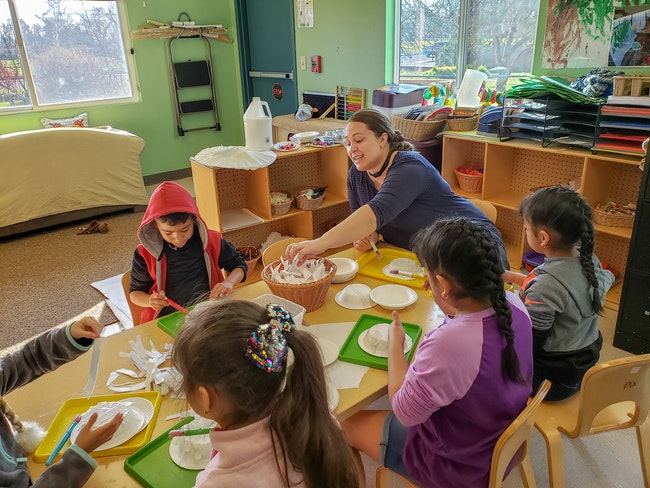
Preschool students work on a paper mache project in class (Rachel Alexander/Salem Reporter)
Leah Peay already had experience working in daycare when she had her first child.
Rather than put her daughter in someone else’s care, she decided to open her own business: a small daycare based out of her south Salem home, where she could care for her own children while helping other working mothers.
Little Arrows Child Care opened in October 2018 and has about 10 clients. Peay said she had no experience running a small business. Learning things like filing more complicated taxes was a challenge.
“This is still a heart thing for me. It’s hard to call it a business … I see other providers and they’re optimizing their child care with slots and all of these things and it’s like – they look at it as a business,” she said, speaking over the phone while cooking morning pancakes for the children in her care.
In early 2022, Peay will head into the classroom for a six month small business management program specifically for child care providers.
It’s being offered for the first time starting in January through Chemeketa Community College’s Small Business Development Center, located in the college’s Center for Business and Industry in central Salem.
The Mid-Willamette Valley Community Action Agency’s Child Care Resource & Referral program is recruiting providers, who will receive classes for free thanks to a $40,000 grant from the city of Salem.
Shannon Vandehey, who runs the program for Community Action, said they hope to better support small child care providers who were most affected by Covid-related shutdowns and safety regulations.
Vandehey said those small businesses often have little support or training in aspects of running a business like filing taxes. That’s especially true for providers who offer care in languages other than English.
“A lot of people out there think family child care is babysitters,” she said. “That’s what we’re trying really hard as a system to change – they are small businesses. And sometimes those providers don’t understand that either.”
Marion and Polk counties both saw significant drops in the number of child care providers operating during the pandemic. Vandehey said small providers were most likely to close their doors.
Salem’s economic development manager, Annie Gorski, said the city opted to use a portion of its federal Community Development Block Grant money which was earmarked for addressing the impacts of the pandemic.
“We continue to hear from businesses about workforce hiring challenges and know that access to quality child care is one of the barriers to work,” Gorski said in an email.
At Chemeketa, a cohort of 20 to 25 child care providers will take evening classes twice weekly from January through mid-June. They’ll also have one-on-one advising about business management.
R. Taylor, dean of Chemeketa’s early childhood education program, said small child care providers are often like Peay, pursuing the work because it’s a passion but lacking the support they need for small business tasks like creating a budget or planning for growth.
“Child care is hard. It’s hard work. And so anytime someone’s entering child care, the more they know, the more it’s a sustainable career track, not just financially. Sustaining your momentum in the field is a challenge and so we want that for people,” Taylor said. “These are people who really care about children and families and it can be hard to figure out how to charge enough, how to build in what you really need to run your business.”
The curriculum is the same one the Small Business Development Center offers through its small business management program, said center director Celia Núñez. But she’s worked with Chemeketa’s early learning program to bring in examples relevant to child care providers, and participants will have the benefit of sharing classes with a group of other child care providers they can learn from.
Núñez said Chemeketa hopes to offer the program regularly after a first cohort in 2022.
“We’d like to be able to do this year after year,” she said.
Peay said she’s eager to get started.
“Knowledge is power so … I want to get as much knowledge as I can so I can also help others as well,” she said.
Slots are still open for the free program. To qualify, a child care provider must earn less than 80% of median income under federal guidelines. That’s less than $45,250 per year for a family of two people, or $56,550 for a family of four.
For an application or with questions, contact Shannon Vandehey at [email protected].
Contact reporter Rachel Alexander: [email protected] or 503-575-1241.
JUST THE FACTS, FOR SALEM – We report on your community with care and depth, fairness and accuracy. Get local news that matters to you. Subscribe to Salem Reporter starting at $5 a month. Click I want to subscribe!









